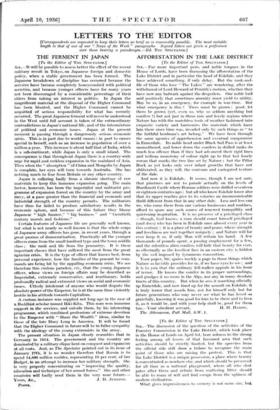THE FERMENT IN JAPAN
LETTERS TO THE EDITOR
[Correspondents are requested to keep their ktters as brief as is reasonably possible. The most suitable length is that of one of our " News of the Week" paragraphs. Signed letters are given a preference over those bearing a pseudonym.—Ed. Tax Sexerst0n.1 [To the Editor of Tax SPECTATOR.] SIR,—It will be possible to assess better the effect of the recent military Cevolt in Tokyo, on Japanese foreign and domestic policy, when a stable government has been formed. The Japanese breakdown of discipline has occurred because the services have become completely honeycombed with political
societies, and because younger officers have for many years not been discouraged by a considerable percentage of their elders from taking an interest in polities. In Japan the magnificent material at the disposal of the Higher Command has been blunted, and the Higher Command cannot be acquitted of serious responsibility for what has recently occurred. The great Japanese ferment will never be understood in the West until full account is taken of the extraordinary contradictions in Japan's national life, and of the intermixture of political and economic issues. Japan at the present moment is passing through a dangerously serious economic crisis. This is in part due to world causes: in part to causes special to herself, such as an increase in population of over a million a year. This increase is about half that of India, which Is a Sub-continent, while Japan is only a small Island. The consequence is that throughout Japan there is a country-wide urge for rapid and reckless expansion in the mainland of Asia. Then when the" absorption "of China and Mongolia by Japan is complete, her eyes will turn towards Australia. She has nothing much to fear from Britain or any other country.
Japan is suffering badly from. a chronic shortage of raw materials to keep this immense expansion going. The main factor, however, has been the imperialist and militarist pro- gramme of expansion forced on the country by the 'army and navy, at a pace greater than the financial and economic and
• industrial strength of the country permits. The militarists have thus far failed to produce satisfactory resultS in the • economic sphere, and because of this failure they blame Japanese "high finance," "big business" and " twentieth century morals and fashions."
• Certain features of Japanese life are generally well known, but what is not nearly so well known is that the whole corps of Japanese army officers has gone, in recent years, through a great process of democratisation. Practically all the younger officers come from the small landlord type and the town middle class ; the rank and file from the peasantry. It is these important classes that have suffered the most from the great agrarian crisis. It is the type of officer that knows best, from personal experience, how the families of the peasant he com- mands are being hit by the appalling economic crisis. We see therefore this curious paradox, viz., that the young Japanese officer, whose views on foreign affairs may be described as Imperialist, extremely conservative, and reactionary, holds profoundly radical and extremist views on social and economic issues. . Utterly intolerant of anyone who would dispute the absolute power of the Emperor, he is at the same time violently hostile in his attitude towards Capitalism.
A curious instance was supplied not long ago in the case of a Buddhist scholar named Ikki-Kita. This man won immense support in the services, and outside them, by his interesting programme, which combined professions of extreme devotion to the Emperor with "Share the Wealth" ideas, similar to those of the late Huey Long in America. It will be found that the Higher Command in future will be in fuller sympathy with the ideology of the young extremists in the army.
The present situation in Japan closely resembles that in Germany in 1914. The government and the country are dominated by a military algae bent on conquest and expansion at all costs. And, as The -Spectator pointed out in its issue of
January. .17th, it is no wonder therefore that Russia is to spend 14,1309 million roubles, representing 19 per cent, of her Budget, in an attempt to increase her military strength. She is very properly concentrating on "improving the quality, education and technique of her armed forces." She and other countries will badly need them in the very near future.—










































 Previous page
Previous page